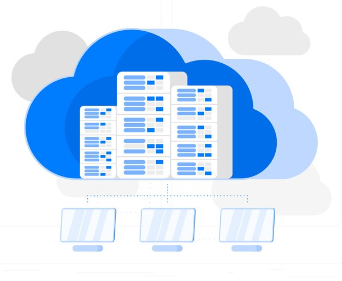Cloud Server Providers
In today’s digital landscape, businesses are increasingly turning to cloud server providers to meet their computing needs. But what exactly are these providers, and why are they so essential in modern business operations?
Cloud server providers are companies that offer cloud computing services, allowing businesses to store, manage, and access their data and applications over the internet, rather than on physical servers.
This shift to the cloud offers numerous benefits, including increased flexibility, scalability, and cost-effectiveness.
Types of Cloud Server Providers
Public Cloud Providers
Public cloud providers offer cloud services to multiple clients over the Internet. They host resources and applications in data centers that are accessible to the public.
Some prominent examples of public cloud providers include Amazon Web Services (AWS), Microsoft Azure, and Google Cloud Platform (GCP).
Private Cloud Providers
Private cloud providers, on the other hand, offer cloud services exclusively to a single organization. These services can be hosted on-premises or by a third-party provider, offering greater control and customization options.
Examples of private cloud providers include VMware Cloud and IBM Cloud.
Hybrid Cloud Providers
Hybrid cloud providers offer a combination of public and private cloud services, allowing businesses to leverage the benefits of both environments.
This approach provides flexibility, scalability, and enhanced security. Providers like Oracle Cloud and Dell Technologies offer robust hybrid cloud solutions.
Key Features and Benefits
Scalability
Cloud server providers offer scalability by allowing businesses to easily adjust their computing resources based on demand. This ensures optimal performance during peak times and cost savings during periods of low activity.
The benefits of scalable cloud solutions include improved efficiency, agility, and resource utilization.
Reliability
Reliability is paramount in cloud server providers, as businesses rely on these services to keep their operations running smoothly.
Providers ensure reliability through redundant infrastructure, data replication, and disaster recovery measures. Assessing reliability involves evaluating uptime guarantees, service-level agreements (SLAs), and customer reviews.
Security
Security is a top priority for cloud server providers, given the sensitive nature of the data stored and processed in the cloud.
Providers implement robust security measures, such as encryption, access controls, and threat detection systems, to protect against cyber threats and data breaches.
Businesses must prioritize data security when selecting a cloud provider to safeguard their valuable assets.
Cost-effectiveness
Cloud server providers offer cost-saving benefits by eliminating the need for on-premises hardware and infrastructure maintenance.
Businesses pay only for the resources they use, avoiding upfront capital expenses and reducing operational costs. Factors influencing cost-effectiveness include pricing models, resource optimization, and workload management strategies.
Choosing the Right Cloud Server Provider
Assessing Business Needs
When choosing a cloud server provider, it’s essential to understand your specific business requirements and objectives. Factors to consider include workload type, performance requirements, compliance regulations, and budget constraints.
Conducting a thorough assessment will help align your needs with the provider’s capabilities.
Performance Metrics
Key performance indicators (KPIs) are crucial for evaluating the performance of cloud server providers. Metrics such as uptime, latency, throughput, and response time provide insights into reliability and responsiveness.
Businesses should establish benchmarks and monitor performance regularly to ensure optimal service delivery.
Service Level Agreements (SLAs)
SLAs define the terms of service between a cloud provider and its customers, outlining performance guarantees, uptime commitments, and support levels.
When choosing a provider, it’s essential to review SLAs carefully and ensure they meet your business requirements. Look for provisions related to service credits, escalation procedures, and compliance standards.
Popular Cloud Server Providers
Amazon Web Services (AWS)
AWS is a leading cloud provider, offering a comprehensive suite of services for computing, storage, networking, and analytics. Unique features of AWS include its global infrastructure, extensive service portfolio, and robust security and compliance capabilities.
Microsoft Azure
Azure is Microsoft’s cloud platform, providing a broad range of services for building, deploying, and managing applications and services.
Key advantages of Azure include seamless integration with Microsoft products, hybrid cloud capabilities, and industry-specific solutions.
Google Cloud Platform (GCP)
GCP offers a diverse set of cloud services, including computing, storage, machine learning, and IoT solutions. Notable features of GCP include its data analytics and AI capabilities, global network infrastructure, and commitment to sustainability and innovation.
Case Studies
Case Study 1: Company X’s Migration to AWS
Company X faced challenges with their on-premises infrastructure, including limited scalability and high maintenance costs. By migrating to AWS, they achieved greater flexibility, scalability, and cost savings. Benefits included improved performance, enhanced security, and streamlined operations.
Case Study 2: Organization Y’s Utilization of Azure for Data Analytics
Organization Y leveraged Azure for its data analytics initiatives, utilizing services such as Azure Synapse Analytics and Azure Machine Learning.
The implementation process involved data migration, integration, and customization to meet specific business requirements. Results included faster insights, improved decision-making, and reduced time-to-market.
Best Practices for Utilizing Cloud Server Providers
Regular Performance Monitoring
Monitoring cloud performance is essential for identifying issues, optimizing resources, and ensuring service reliability.
Tools and techniques such as cloud monitoring platforms, performance analytics, and automated alerts help businesses track performance metrics and respond to anomalies proactively.
Data Backup and Recovery
Implementing robust data backup and recovery strategies is critical for protecting against data loss and ensuring business continuity.
Cloud providers offer backup and recovery solutions, including automated backups, snapshotting, and replication. Businesses should develop comprehensive recovery plans and regularly test them to verify effectiveness.
Continuous Optimization
Optimizing cloud resources is essential for maximizing cost efficiency and performance. Practices such as rightsizing instances, leveraging reserved capacity, and implementing automation help businesses optimize their cloud spending and resource utilization.
Continuous review and adjustment are key to maintaining optimization over time.
Future Trends in Cloud Server Providers
Edge Computing Integration
Edge computing brings compute resources closer to the point of data generation, enabling real-time processing and low-latency applications.
Cloud server providers are integrating edge computing capabilities into their offerings to support edge-to-cloud workflows and address latency-sensitive use cases.
AI and Machine Learning Integration
AI and machine learning are increasingly being integrated into cloud services, offering advanced analytics, predictive insights, and automation capabilities.
Cloud providers are leveraging AI and ML technologies to enhance security, optimize performance, and deliver personalized experiences to customers.
Conclusion
In conclusion, cloud server providers play a crucial role in modern business operations, offering scalable, reliable, secure, and cost-effective computing solutions.
As businesses continue to embrace cloud technology, the future of cloud computing holds exciting possibilities, including edge computing integration, AI and ML advancements, and continued innovation in cloud services and solutions.
By partnering with the right cloud provider and adopting best practices, businesses can unlock the full potential of the cloud and drive efficiency, agility, and innovation in their operations.






